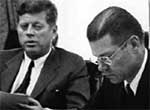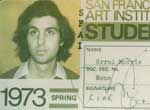By Todd McCarthy
Daily Variety - May 23, 2003
A Sony Pictures Classics release of a Senart Films & @Radical.Media production in association with Globe Department Store. Produced by Errol Morris, Michael Williams, Julie Ahlberg. Executive producers, Jack Lechner, Jon Kamen, Frank Scherma, Robert Fernandez, Robert May, John Sloss.
Directed by Errol Morris. Camera (color), Peter Donahue, Robert Chappell; editors, Karen Schmeer, Doug Abel, Chyld King; music, Philip Glass; additional music, John Kusiak; production designers, Ted Bafaloukos, Steve Hardy; sound, Steve Bores; supervising sound editor, Coll Anderson; sound designer, Tom Paul; visual effects supervisor, Robin Hobart; 3-D animator, Zachary Morong; animation and visual effects, Evan Olson; associate producers, Ann Petrone, Adam Kosberg. Reviewed at Cannes Film Festival (Special Screenings), May 21, 2003. Running time: 105 MIN.
With: Robert S. McNamara.
Moving away from oddball subject matter to tackle some major issues stemming from a thick slice of history, Errol Morris delivers a compelling, thoughtful and entirely involving documentary in "The Fog of War." Many will come to the film with their minds long since made up about its central figure, former Secretary of Defense Robert S. McNamara. But pic quickly encourages the viewer to open up to its bracing but non-confrontational attitude and share Morris' complex exploration of moral issues, human foibles, chance and freshly spotlighted historical evidence that may not change people's opinions but could modify and enrich them. Destined to be a significant specialized attraction, Sony Pictures release has lots to say and will provoke considerable comment not only among critics but also among columnists and historians on the ever-relevant subject of war.
Widely admired for his creatively askew approach to unusual material, which sometimes but not always has socio-political currency, Morris was originally promised only an hour of interview time by McNamara and intended to do just a short television piece on the 85-year-old statesman/businessman, who has been interviewed countless times. But McNamara, often considered the architect of the Vietnam War, ended up giving Morris 20 hours, which gave the filmmaker enough not only to cover Vietnam but the entirety of McNamara's life, which began during World War I.
Morris structures the film in the form of "11 lessons from the life of Robert S. McNamara," lessons he extrapolates from formulations posited by the subject himself. But anyone familiar with Morris' unorthodox methods will know that they won't be getting a lecture or standard history lesson. Enabled by McNamara's lifespan to cover some of the major conflicts of the 20th century, notably World War II, in which he participated, and the Cuban Missile Crisis and Vietnam, in which he was a crucial player, Morris uses specific incidents to broaden the discussion from who did what and why to larger philosophical conundrums.
Photographed in an attractive modernistic setting, McNamara belies his age by coming across as fit, alert, feisty and entirely on top of memories as well as statistics. At the same time, he's not rotely defensive of everything he's done in his life. A proud and smart man, he can acknowledge the tragedy in what's he's been involved in and has thought about it deeply, but hasn't been crushed by it; he's just dealt with it.
Employing an amazing array of archival footage --- some of it familiar but much of it fresh and of exceptional visual quality, especially some color Vietnam material that practically looks like it was shot for a feature --- Morris jumps quickly to McNamara's seven-year tenure as secretary of defense, 1961-68, during which time the former official claims the U.S. three times came to "within a hair's breadth" of nuclear war with the U.S.S.R. Among the fascinating facts McNamara mentions is that, while the CIA was convinced that Cuba had the missiles but not the warheads in October, 1962, Fidel Castro personally told McNamara at a conference 30 years later that, not only were there many nuclear warheads on the island at the time, but that he recommended that Khruschev use them, knowing full well that Cuba would be wiped out as a result.
McNamara reasons that the U.S. was able to come out on top in that crisis, not because he or JFK or anyone was else was such a genius, but because Washington was able to "empathize" with its enemy; America understood its adversaries sufficiently to know what it would take to allow them to save face in defeat. Such was not the case in Vietnam, he admits. The big mistake there was the legacy that carried over from the '50s, to think of Vietnam strictly in geopolitical Cold War terms; as a former North Vietnamese leader much later pointed out to him, what the Americans didn't understand was that, for Ho Chi Minh, the war with the U.S. was just the final phase of a war for independence that had been going on for nearly 100 years, one that they knew they had to win.
After backtracking to move through some biographical details leading up to McNamara's service as an Air Force officer during World War II, Morris and his subject dwell on the little-discussed subject of the firebombing of Tokyo in 1945, in which some 100,000 civilians were killed in one night, not to mention similar devastation that was wrought on other cities. Quoting his commander, the notoriously brutal Gen. Curtis LeMay, to the effect that, had the U.S. lost the war, they all could have been called up on war crimes charges, McNamara deepens the discussion by asking what is more moral: Wiping out all those innocent Japanese, or not bombing and going ahead with a land invasion, which would certainly have cost that many or more American casualties? Such are the awful and unknowable questions raised by war.
Other remarkable moments that bring history to life and bring greater nuance to it stem from White House tape recordings from both the JFK and LBJ years. One explicitly asserts President Kennedy's sentiment, in 1963, that the U.S. had to find a way to get out of Vietnam --- a view that McNamara believes Kennedy would have acted upon had he lived --- while another reveals Johnson warning McNamara about creating the impression that Washington was interested in withdrawing. Later tapes underscore LBJ's damned-if-you-do, damned-if-you-don't dilemma, particularly one in which he says to his defense secretary re: sending the Marines into Vietnam in 1965: "My answer is yes but my judgment is no."
Reason, McNamara concludes, is not enough to create order in the world; emotions and human nature often supercede good sense. What will play well to non-fans of today's U.S. administration is one lesson McNamara learned from Vietnam --- that America should refrain from unilateral action around the world and make sure to gather support from allies.
In the end, McNamara acknowledges having made monumental errors but is also proud of his many accomplishments. Although it seems to set up an opportunity for some hindsight, the one chance Morris misses is getting McNamara to speculate what might have happened if the U.S. had simply pulled out of Vietnam in the mid-'60s, as JFK seems to have wished.
Film is superbly outfitted technically, although print screened in Cannes had a temp track of Philip Glass music rather than the new one he has yet to record for the picture.
The Fog of War
REVIEWS/ARTICLES
Fred Kaplan (Fog of War)
Samantha Power (Fog of War)
Ron Rosenbaum (Fog of War)
Kenneth Turan (Fog of War)
Peter Applebome (Mr. Death)
Ron Rosenbaum (Mr. Death)
Todd McCarthy (Fast, Cheap & Out of Control)
David Ansen (Fast, Cheap & Out of Control)
Roger Ebert (The Thin Blue Line)
Terrence Rafferty (The Thin Blue Line)
Janet Maslin (Vernon, Florida)
Alan Berger (Gates of Heaven)
Michael Covino (Gates of Heaven)
Roger Ebert (Gates of Heaven)
MORE FOG OF WAR
Official Film Website
Synopsis
Transcript
Watch Clip
Storyboards
Academy Awards Acceptance Speech
Fog of War Glossary
McNamara Gallery
B-29 Cluster Layout
'Fog of War' vs. 'Stop the Presses' (Argument)
Ounce Of Preventive War, Pound Of Destruction (Editorial)
BUY THIS MOVIE
Amazon
OTHER FILMS
Gates of Heaven
Vernon, Florida
The Thin Blue Line
A Brief History of Time
Fast, Cheap & Out of Control
Mr. Death
Standard Operating Procedure
Tabloid
The Unknown Known
The B-Side
Wormwood
American Dharma







